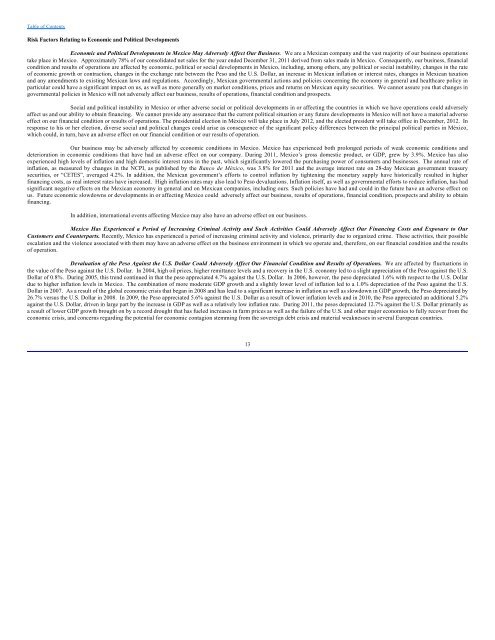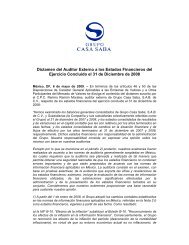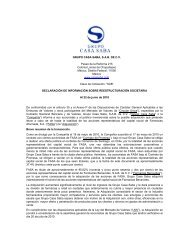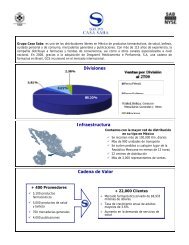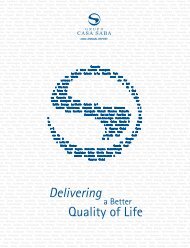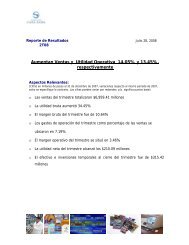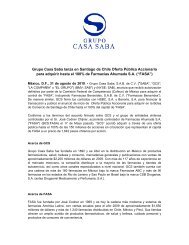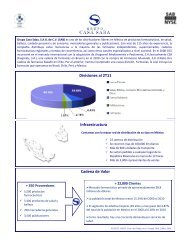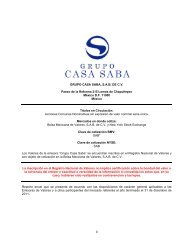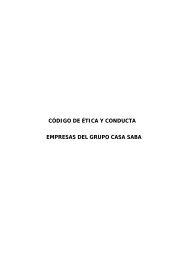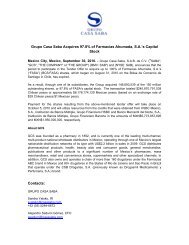FORM 20-F Grupo Casa Saba, S.A.B. de C.V.
FORM 20-F Grupo Casa Saba, S.A.B. de C.V.
FORM 20-F Grupo Casa Saba, S.A.B. de C.V.
You also want an ePaper? Increase the reach of your titles
YUMPU automatically turns print PDFs into web optimized ePapers that Google loves.
Table of Contents<br />
Risk Factors Relating to Economic and Political Developments<br />
Economic and Political Developments in Mexico May Adversely Affect Our Business. We are a Mexican company and the vast majority of our business operations<br />
take place in Mexico. Approximately 78% of our consolidated net sales for the year en<strong>de</strong>d December 31, <strong>20</strong>11 <strong>de</strong>rived from sales ma<strong>de</strong> in Mexico. Consequently, our business, financial<br />
condition and results of operations are affected by economic, political or social <strong>de</strong>velopments in Mexico, including, among others, any political or social instability, changes in the rate<br />
of economic growth or contraction, changes in the exchange rate between the Peso and the U.S. Dollar, an increase in Mexican inflation or interest rates, changes in Mexican taxation<br />
and any amendments to existing Mexican laws and regulations. Accordingly, Mexican governmental actions and policies concerning the economy in general and healthcare policy in<br />
particular could have a significant impact on us, as well as more generally on market conditions, prices and returns on Mexican equity securities. We cannot assure you that changes in<br />
governmental policies in Mexico will not adversely affect our business, results of operations, financial condition and prospects.<br />
Social and political instability in Mexico or other adverse social or political <strong>de</strong>velopments in or affecting the countries in which we have operations could adversely<br />
affect us and our ability to obtain financing. We cannot provi<strong>de</strong> any assurance that the current political situation or any future <strong>de</strong>velopments in Mexico will not have a material adverse<br />
effect on our financial condition or results of operations. The presi<strong>de</strong>ntial election in México will take place in July <strong>20</strong>12, and the elected presi<strong>de</strong>nt will take office in December, <strong>20</strong>12. In<br />
response to his or her election, diverse social and political changes could arise as consequence of the significant policy differences between the principal political parties in México,<br />
which could, in turn, have an adverse effect on our financial condition or our results of operation.<br />
Our business may be adversely affected by economic conditions in Mexico. Mexico has experienced both prolonged periods of weak economic conditions and<br />
<strong>de</strong>terioration in economic conditions that have had an adverse effect on our company. During <strong>20</strong>11, Mexico’s gross domestic product, or GDP, grew by 3.9%. Mexico has also<br />
experienced high levels of inflation and high domestic interest rates in the past, which significantly lowered the purchasing power of consumers and businesses. The annual rate of<br />
inflation, as measured by changes in the NCPI, as published by the Banco <strong>de</strong> México, was 3.8% for <strong>20</strong>11 and the average interest rate on 28-day Mexican government treasury<br />
securities, or “CETES”, averaged 4.2%. In addition, the Mexican government’s efforts to control inflation by tightening the monetary supply have historically resulted in higher<br />
financing costs, as real interest rates have increased. High inflation rates may also lead to Peso <strong>de</strong>valuations. Inflation itself, as well as governmental efforts to reduce inflation, has had<br />
significant negative effects on the Mexican economy in general and on Mexican companies, including ours. Such policies have had and could in the future have an adverse effect on<br />
us. Future economic slowdowns or <strong>de</strong>velopments in or affecting Mexico could adversely affect our business, results of operations, financial condition, prospects and ability to obtain<br />
financing.<br />
In addition, international events affecting Mexico may also have an adverse effect on our business.<br />
Mexico Has Experienced a Period of Increasing Criminal Activity and Such Activities Could Adversely Affect Our Financing Costs and Exposure to Our<br />
Customers and Counterparts. Recently, Mexico has experienced a period of increasing criminal activity and violence, primarily due to organized crime. These activities, their possible<br />
escalation and the violence associated with them may have an adverse effect on the business environment in which we operate and, therefore, on our financial condition and the results<br />
of operation.<br />
Devaluation of the Peso Against the U.S. Dollar Could Adversely Affect Our Financial Condition and Results of Operations. We are affected by fluctuations in<br />
the value of the Peso against the U.S. Dollar. In <strong>20</strong>04, high oil prices, higher remittance levels and a recovery in the U.S. economy led to a slight appreciation of the Peso against the U.S.<br />
Dollar of 0.8%. During <strong>20</strong>05, this trend continued in that the peso appreciated 4.7% against the U.S. Dollar. In <strong>20</strong>06, however, the peso <strong>de</strong>preciated 1.6% with respect to the U.S. Dollar<br />
due to higher inflation levels in Mexico. The combination of more mo<strong>de</strong>rate GDP growth and a slightly lower level of inflation led to a 1.0% <strong>de</strong>preciation of the Peso against the U.S.<br />
Dollar in <strong>20</strong>07. As a result of the global economic crisis that began in <strong>20</strong>08 and has lead to a significant increase in inflation as well as slowdown in GDP growth, the Peso <strong>de</strong>preciated by<br />
26.7% versus the U.S. Dollar in <strong>20</strong>08. In <strong>20</strong>09, the Peso appreciated 5.6% against the U.S. Dollar as a result of lower inflation levels and in <strong>20</strong>10, the Peso appreciated an additional 5.2%<br />
against the U.S. Dollar, driven in large part by the increase in GDP as well as a relatively low inflation rate. During <strong>20</strong>11, the pesos <strong>de</strong>preciated 12.7% against the U.S. Dollar primarily as<br />
a result of lower GDP growth brought on by a record drought that has fueled increases in farm prices as well as the failure of the U.S. and other major economies to fully recover from the<br />
economic crisis, and concerns regarding the potential for economic contagion stemming from the sovereign <strong>de</strong>bt crisis and material weaknesses in several European countries.<br />
13


